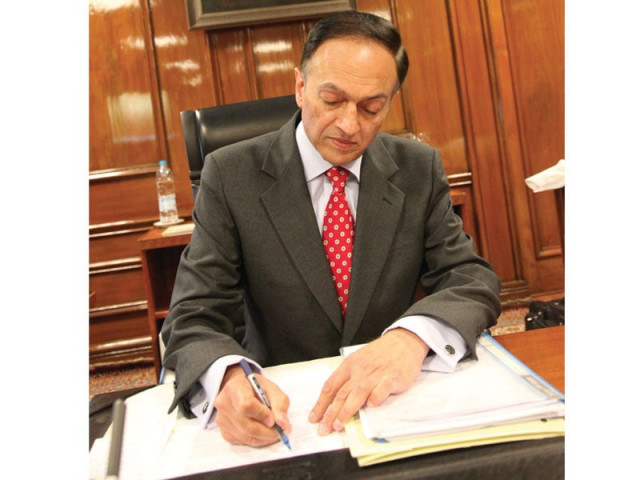SBP: New governor to push for greater central bank independence
Says interest rate cuts earlier in the month were not made under political pressure.

Newly-appointed State Bank Governor Yaseen Anwar plans on working closely with the Senate to sanctify into law the SBP’s independence – something it has worked to establish in practice over the past decade.
The State Bank (Amendment) Bill – which would reduce the role of the finance ministry in overseeing the central bank and abolish the government’s right to supersede the SBP’s decisions – was unanimously passed in the National Assembly on November 4, 2010.
However, it very quickly ran aground in the Senate finance committee, where legislators from both sides of the aisle objected to the degree of independence being sought by the SBP. The senators objected in particular to the clauses that would place legal restrictions on government borrowing from the central bank, as well as the abolition of the authority to supersede central bank decisions.
Anwar hopes to get the upper house of parliament to reconsider. “I hope to have some of those clauses reinstated,” he said in an interview with The Express Tribune.
The governor, however, was quick to dispel notions that the central bank was being subjected to political pressure, particularly with respect to the October 4 cut in the discount rate (the interest rate at which commercial banks can borrow from the SBP’s discount window).
The central bank caught the market by surprise by slashing the benchmark rate from 14% to 12.5%. There had been speculation in many newspapers that the cut – which would reduce the cost of borrowing throughout the economy – was made under pressure from the government. Anwar, however, explained the decision-making process.
(Read: Explaining the rate cut - A case of contrasting styles)
“The monetary policy was first discussed in the internal monetary policy committee of the State Bank, which includes leading economists,” said the governor. “The consensus that eventually developed was of around a 1.5% cut. That recommendation was then sent to the Central Board, which then approved the decision.”
Anwar also said that the government plans on restricting borrowing from the central bank to a minimum and maintain fiscal discipline. “Even though we have exited the IMF programme, we will continue to operate as though we are under that programme.”
That includes, he said, a borrowing limit of Rs1,155 billion for the federal government, much of which comes from commercial banks that buy treasury bills.
The Wharton-educated governor was appointed to his current position on October 19, after having served twice as the acting governor during the two periods the government’s previous appointees resigned their post prematurely.
He had been serving since March 2007 as the deputy governor, and the head of the Banking Services Corporation, a wholly-owned subsidiary of the central bank that accounts for nearly 80% of its 6,000-man workforce. The BSC serves as the operational arm of the State Bank. His experience in leading that division, Anwar feels, helped give him an edge over his potential rivals for the job.
“When I was appointed and started working as governor, I didn’t miss a beat,” said Anwar. “I knew the history of every file I looked at. That continuity meant that we don’t lose out on stability.”
Yet one gets the impression that the appointment comes to Anwar as something of a relief. “When I was serving in both roles – as acting governor as well as deputy governor – I was working 18-hour days.”
“I was only taking everyday decisions as acting governor, since it would be unfair to any person who would eventually be made governor. Now that I have the job, I can take longer-term decisions,” he said.
Published in The Express Tribune, October 28th, 2011.



















COMMENTS
Comments are moderated and generally will be posted if they are on-topic and not abusive.
For more information, please see our Comments FAQ